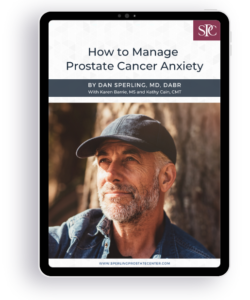The word is out: Patients with early stage, low risk prostate cancer have often been rushed into radical prostatectomy when many of them could have afforded to wait to seek treatment—possibly for years. Untold numbers of men were left with urinary and sexual problems that lasted for months, or were never fully resolved.
For low risk patients, the pendulum has been gradually swinging away from immediate surgery toward active surveillance (AS) as a management strategy. Urologists are increasingly assuring such patients that they can afford to hold off on treatment, thus avoiding the risks of side effects. Over a decade ago, it was estimated that some form of surveillance was being used by 7-14% of low risk patients, whereas from 2010-2013 the rate increased to 40%.
However safe AS may be, some men can’t tolerate not knowing if and when their cancer will grow larger or become more aggressive. Not every prostate cancer patient can let go of the worry over a potential time bomb growing in his body. A recent study found that certain patient characteristics may deter them from choosing or fully complying with AS protocols:
- Existing depressive symptoms
- Family history of prostate cancer
- Moderate-to-severe urinary problems.[i]
At our Center, we are able to offer a different kind of assurance to patients through our image-guided Focal Laser Ablation (FLA). By doing what some of our patients call “zapping” the tumor with the precise power of laser, we can offer a happy medium between doing nothing and doing too much. Our patients literally get up and walk away from their FLA treatment with a very high degree of confidence that we have destroyed their disease. They fully engage with our noninvasive follow-up protocol that uses multiparametric MRI to verify treatment success, and to monitor for any new cancer growth. Furthermore, since our imaging can catch any new growth early, all treatment options – including a repeat FLA – are still open.
While we can’t take away every worry a person might face, it makes everyone on our team happy to know that we are treating prostate cancers in a way that eases uncertainty. We know that AS is a great choice for the right person; but for those who don’t want worry to eat away at their peace of mind, we have a great solution.
Download Our Free Ebook: “How to Manage Prostate Cancer Anxiety”

Don’t let anxiety over prostate cancer run you. Instead, learn how you can take charge and empower yourself to manage stress and boost positive treatment outcomes with our “first aid kit” of practical tips and tools.
NOTE: This content is solely for purposes of information and does not substitute for diagnostic or medical advice. Talk to your doctor if you are experiencing pelvic pain, or have any other health concerns or questions of a personal medical nature.
References
[i] Tan H-J, Marks LS, Hoyt MA, Kwan L et al. The relationship between intolerance of uncertainty and anxiety in men on active surveillance for prostate cancer. J Urol. 2016 Feb 09 [Epub ahead of print]


